Setting up the MS Exchange and Microsoft 365 services
You can add an email service provider using several methods.
Note
To set up connection parameters for email providers, a user must have the permission to run the [Access to “Access rights” workspace] (CanManageAdministration) system operation.
Learn more about using system operations in the “System operation permissions” article.
Method 1. Adding the provider from the [Email] tab of the communication panel
1.In the communication panel, click  to open the [Email] tab.
to open the [Email] tab.
2.Click  and select the [New email account] action (Fig. 1).
and select the [New email account] action (Fig. 1).
Fig. 1 Adding a new email account
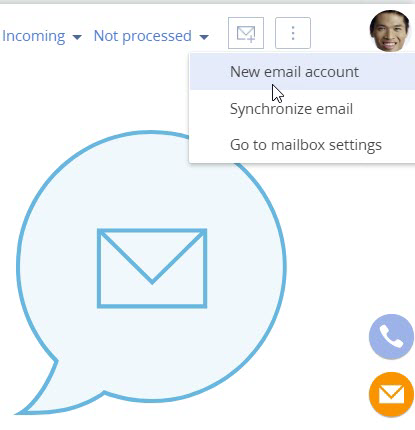
Note
You can also add a new email account by selecting the [Go to mailbox settings actions] under  and clicking [New] on the page that opens.
and clicking [New] on the page that opens.
3.Enter the email address in the displayed [New email account] widow, and click [Next].
4.Click the [Add New Server] button.
Note
Add the domains of a new provider to the [Email providers domains] lookup to have Creatio automatically identify this email provider in the future. As a result, users will not have to specify the mail provider manually when setting up an email account.
5.On the opened page, click [Add] (Fig. 2).
Fig. 2 Adding a new email provider
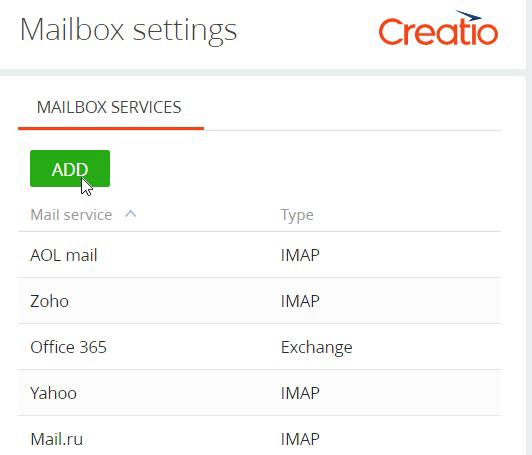
6.On the page that opens, select “Exchange” in the [Service type] field.
7.Populate the [Service address] field in the “example.exchange.com” format (Fig. 3).
Fig. 3 Specifying the mail service address
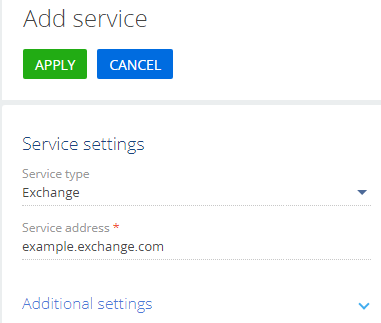
8.You can also populate the additional settings to set up receiving and sending emails, specify the login format, service name and the authentication method (Fig. 4).
Note
Setting up passwordless OAuth authentication for Microsoft 365 requires an existing OAuth application. Read more in the “Setting up OAuth authentication for integration with Microsoft 365.” article.
Fig. 4 Additional settings of the mail service
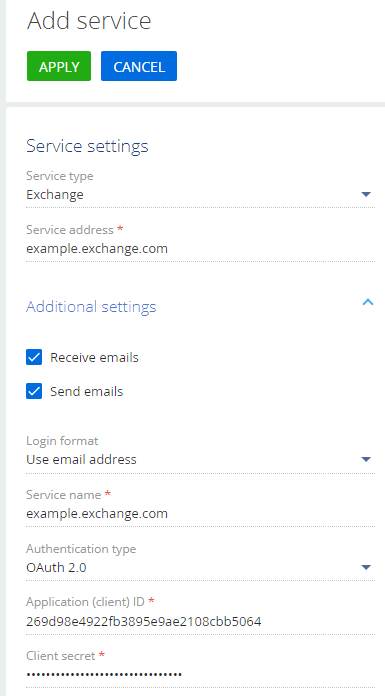
Enable receiving and sending emails:
Select the [Receive emails] and/or [Send emails] option.
Select at least one checkbox.
Set up the mailbox login format:
•Select the [Use manual entry] option if users enter their email address and username.
•Select the [Use email address] option if the full email address is used as a login (for instance, “example@google.com”).
•Select the [Use mailbox name] option if the part of the email address before “@” is used as a username. For example, the “test” will be a login for “test@google.com” email address.
Set up the authentication method:
•Select “Basic” for the basic authentication using the user name and password with Base64 encryption.
•Select “OAuth 2.0” to restrict the service access to protected user resources without the need to pass the login and password. Populate the [Application (client) ID] and [Client secret] required fields.
[Application (client) ID] is generated by the Microsoft authentication server. The documentation and API may refer to the application ID as “Product ID.”
[Client secret] – a secret key generated by the authentication server. The documentation and API may refer to the client secret as “Product key.”
9.Save the settings by clicking [Apply].
As a result, system users will be able to use the email provider to send and receive email messages.
Method 2. Adding the email provider from the user profile
1.Open the user profile page by clicking the [Profile] image button on the main page of the application.
2.Click [Email accounts] (Fig. 5).
Fig. 5 Opening the email accounts
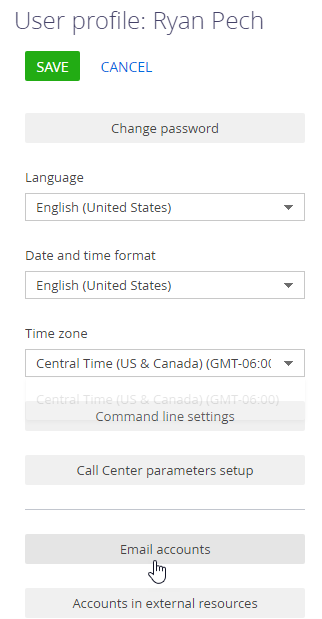
3.Click [New] in the opened window.
To complete the setup, perform steps 3–9, described above in Method 1.
Note
To delete a mail server, delete all its mailboxes (email accounts) first.
See also






